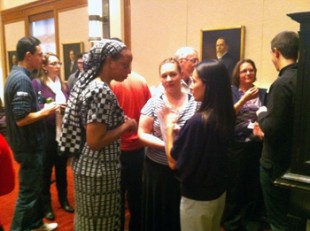Forum during International Education Week focuses on outreach to Brazil
Rice University’s first dual-degree doctoral program with the Universidade Estadual de Campinas joins the list of Rice’s outreach efforts in Brazil.
The program, approved at the Nov. 14 Faculty Senate meeting, will allow history graduate students who study at both Rice and Campinas to receive a Ph.D. from both schools if they meet certain criteria.
“If you’re a student from Brazil or from the U.S., you don’t have to make a decision as to whether you want to have your Ph.D. from a leading Brazilian institution or a leading American institution,” Provost George McLendon said at a Nov. 14 forum during International Education Week. “You can have both at the same time.
“This is a very exciting opportunity for us not only in the context of Brazil but also in the context of possible other international partners. It also enables us to expand our offerings in a critical area of historical studies that would be hard to do if we only called on our own faculty.”

Students, faculty and staff met for Brazilian coffee, refreshments and conversation after the International Education Week forum on Rice's initiatives in Brazil.
The forum was organized by Associate Vice Provost for International Education Adria Baker, executive director of the Office of International Students and Scholars, to update students, faculty and staff about Rice’s initiatives in Brazil as part of the university’s expanding international outreach.
McLendon noted several other developments in Brazil, including a collaboration with the Universidade Federal de Santa Catarina in Florianopolis to remediate urban water that has been used to produce hydrocarbons for energy use. Pedro Alvarez, Rice’s George R. Brown Professor and chair of the Department of Civil and Environmental Engineering, has a longstanding collaboration with Universidade Federal’s department chair on this issue, and support from British Gas will enable faculty and students from the two schools work together on this project, McLendon said.
The first U.S.-Brazil binational supercomputer center, which was announced earlier this year as a collaboration with IBM and the University of São Paulo (USP), is working at an “extraordinary level,” McLendon said. The IBM Blue Gene supercomputer is “one of the 400 largest computers on Earth and the largest supercomputer available to Brazil,” McLendon said. “Right now our Brazilian friends are using more of the computer time than Rice is, and that’s great. It means it’s actually working.” José Onuchic, Rice’s Harry C. and Olga K. Wiess Chair of Physics and professor of physics and astronomy, is heading up this project with USP.
McLendon also cited the Latin American studies major that Rice began offering this fall. He said Dean of Humanities Nicolas Shumway, the Frances Moody Newman Professor of Humanities and professor of Hispanic studies, has a strong commitment to undergraduate students spending more time deeply immersed in another cultural setting like Brazil where they have to speak and do research in Portuguese. “By summer 2014, we will have a fully implemented program for Rice undergraduates to spend six to 10 weeks in a total language, culture and intellectual immersion program in Portuguese only,” McLendon said.
Other presenters at the International Education Week forum included:
* Alida Metcalf, the Harris Masterson Jr. Professor of History, and Farès El-Dahdad, professor of architecture and director of the Humanities Research Center, who are attempting to document the physical and social changes in Rio de Janeiro since 1502 by studying maps, images and constructed projects and creating a platform where scholars can research this data.
* Suzana Bloem, lecturer of Portuguese, who gave a cultural tip on the popularity of the Amazonian fruit guarana that is used to make a sweet soft drink.
* Rafael da Silva Rezende, one of six undergraduate visiting students from Brazil at Rice this fall through the Science Without Borders program, who shared how much he’s enjoying his experience at Rice.
* Mayra Onuchic, program administrator for Brasil@Rice, and Sherridan Schwartz, program specialist for Brasil@Rice, who discussed their role in recruiting and providing support to Brazilian students and scholars at Rice, and in making Rice faculty, staff and students aware of exchange opportunities available in Brazil through Science Without Borders, the Institute for International Education and other resources.
After the program, Baker invited everyone to the Founder’s Room in Lovett Hall for Brazilian coffee, refreshments and conversation to continue the celebration of International Education Week. IEW is a joint initiative of the U.S. Department of State and the U.S. Department of Education to promote programs that prepare Americans for a global environment and attract future leaders from abroad to study, learn and exchange experiences in the United States.
In addition to the iinitiatives discussed at the forum, Rice has a memorandum of understanding with the University of São Paulo to facilitate an exchange-student program and research collaborations and an agreement with Brazil’s National Council of Scientific and Technological Development (CNPq) that enables postdocs and Ph.D. and undergraduate visiting students from Brazil to study at Rice annually with financial support from the council. Rice’s Baker Institute for Public Policy also has a formal agreement with Brazil’s premier think tank, Fundação Getúlio Vargas, to enhance research and academic relationships.


Leave a Reply